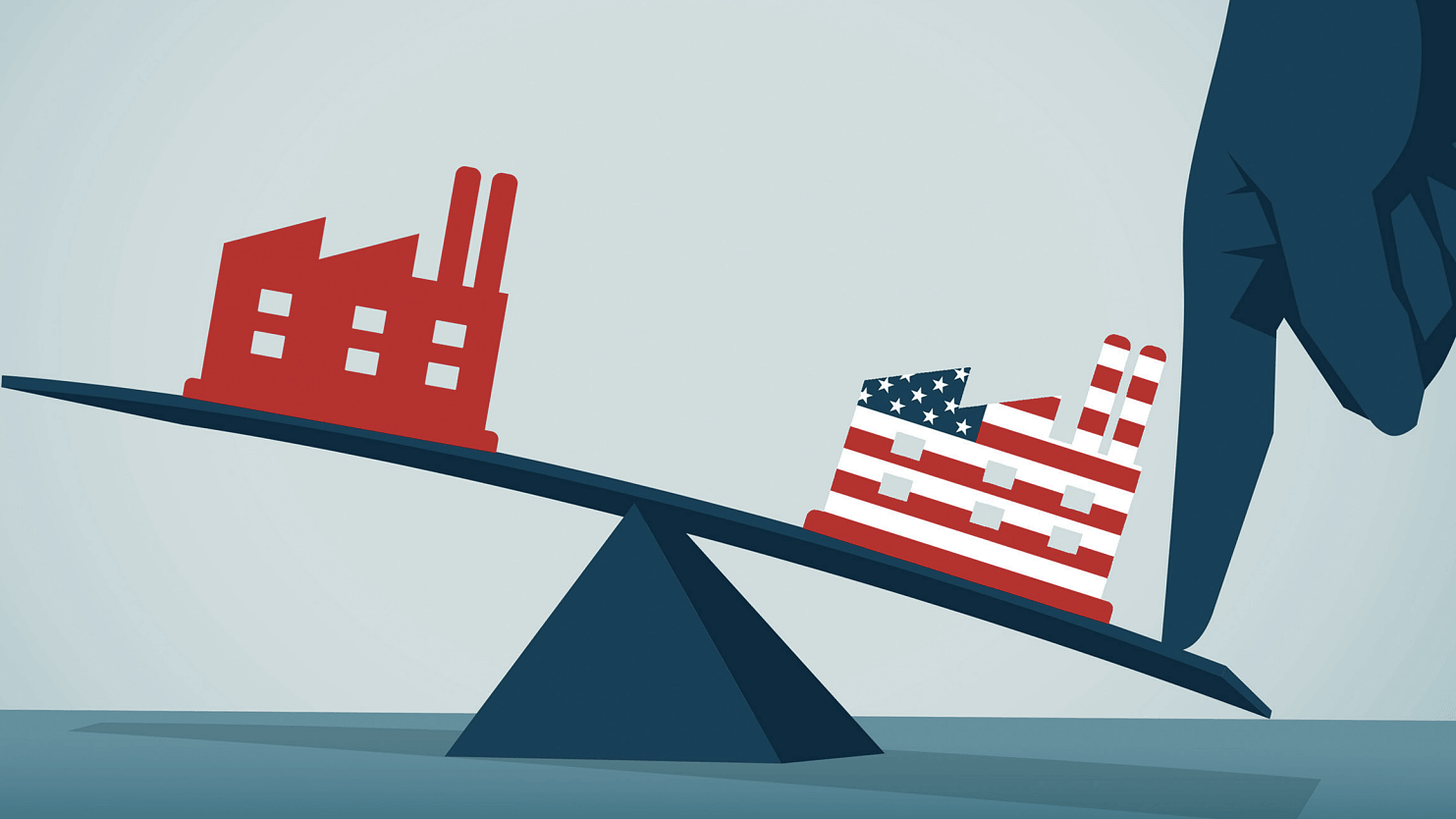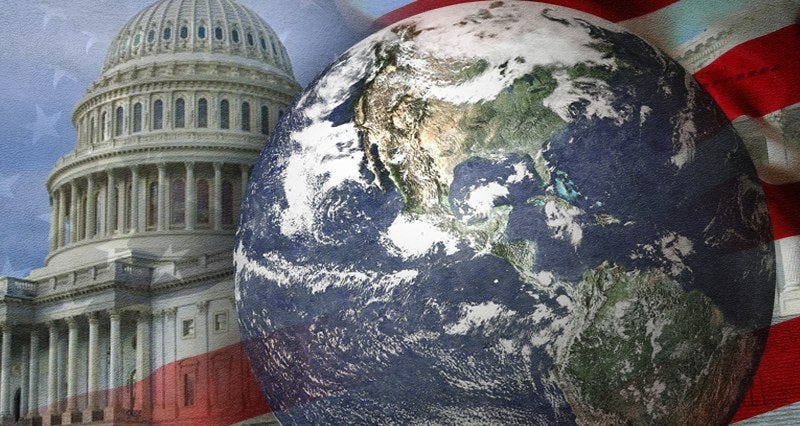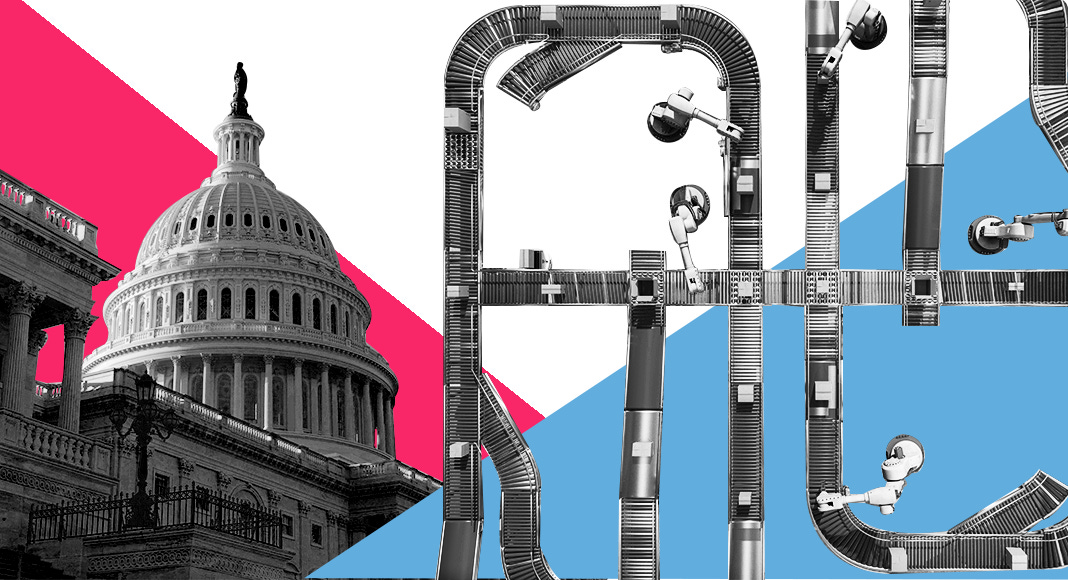The New Washington Consensus - An Industrial Policy For a New American Century
The Biden Regime's Strategy to Maintain and Expand US Hegemony via Economic Reform at Home and Abroad
On April 27th of this year, President Biden’s National Security Advisor, Jake Sullivan, gave a speech on “Renewing American Economic Leadership” at the Brookings Institute. In this speech, he outlined a new vision for how the USA could maintain its global predominance going forward by “integrating domestic and foreign policy”, focusing on economic policies in both realms.
This speech signalled a massive shift in prevailing economic orthodoxy in the USA, moving away from the emphasis on reduction of tariffs abroad and continuously lower rates of taxation at home, towards a new “Industrial Policy” that seeks “not to decouple from China”, but rather “de-risk and diversify” (words which Sullivan borrowed from EU Chief Ursula von der Leyen). Sullivan stood up and said that the old economic order was over and that a new one would have to be built. This was earthshaking stuff!
By now, we should not be surprised by the fact that this speech received very little attention from mainstream media outlets. Conservative media was too busy focusing on the Bud Light Boycott to even notice that the Biden regime is working to do away with the old Washington Consensus that was forged under its hero, Ronald Reagan. Sullivan went as far as calling for a ‘New Washington Consensus’ to replace the told one (a repudiation), adding that this wide-sweeping economic policy vision requires bipartisan congressional support.
When this speech landed on my radar, I searched around for reactions to it, and was quickly disappointed by how little I found. I then went ahead and read the speech. What I found in it makes conservative media look even worse than it possibly ever could, as this went beyond its usual dereliction of duty. Biden’s policy team did what all smart politicians do when faced with a strong challenge to their continued rule: they co-opted parts of the opposition’s platform and claimed them as their own.
The Old Washington Consensus
As the Soviet Union’s economy began to noticeably teeter in the 1980s, the US Treasury Department teamed up with the International Monetary Fund (IMF) and the World Bank to lay the groundwork for became known as “Globalism”. Developing countries, particularly those in Latin America experiencing hyperinflation and huge levels of debt, were to receive loans to rescue them from potential economic collapse. Attached to these loans were requirements selected by the aforementioned trio. These included privatization of state assets and the lowering or elimination of trade tariffs. This would facilitate the entry of these countries into the global economy, and free market economics would do the rest i.e. raise their living standards and turn them into developed countries.
Suffice it to say, what became known pejoratively over time as “Neo-Liberalism” failed to produce the stated intended effect, not just in places like Latin America, but especially at home in the USA, where Reagan’s “Trickle-Down Economics” was followed up by the “great sucking sound” that saw wide swathes of the USA de-industrialize, as manufacturing decamped to countries like Mexico and China. America’s middle class was being hollowed-out, but its elites were getting richer than ever.
The first major shock to Neo-Liberalism came with the 2008 Financial Crisis. The precarious house of cards that was erected by this economic system came very close to crashing down, only being spared at the last minute by a massively coordinated intervention between government and the banking sector. The fast and loose approach to finance, banking and the economy overall saw no one of significance get punished, but did see the middle class suffer and shrink further in size, with the Millennials, fresh out of college, experiencing reduced employment prospects and actual downward social mobility.
American (and other Western) elites managed to weather this storm. Their insistence on tinkering at the edges of the economic system so as to not violate any of its orthodoxies (eg. free trade über alles, offshoring manufacturing, open borders, etc.), saw them being viewed by the majority of their fellow countrymen as being detached from their day-to-day existence. What worked for the elites was clearly not working for the rest.
2016 produced the second major shock to the system, as the British voted in favour of #Brexit, and the USA saw Donald Trump elected as President. Where #Brexit was in large part driven by a popular rejection of mass immigration (a very visible effect of Neo-Liberalism, or even feature of it), it also represented a notable break from the pattern of increasing integration into regional and global economic blocs. Britain, home of one of the world’s financial centres, was purposely cutting itself off in a pique of populism.
Less than five months later, Americans upended all expectations by voting for Donald Trump over Hillary Clinton as the candidate to succeed Barack Obama in office. Trump ran on the platform first used by Patrick J. Buchanan in 1992, when he campaigned on economic nationalism (i.e. protectionism) against the free-trade orthodoxy of George Bush the Elder for the GOP nomination that year. Bush won the nomination, but lost to Bill Clinton, as Ross Perot (author of the “great sucking sound” line) split the vote on the right. In a 2017 interview with Politico, Buchanan described Trump’s shock victory by saying “the ideas made it, but I didn’t”.
From the Politico article:
“Between the years on ‘Crossfire’ and the years he ran for president, he was conservative but became very protectionist and nationalist, and that was of course a surprise,” Kinsley tells me. “The Republican Party stood for free markets completely and the Democratic Party stood for protectionism, and the idea that Pat Buchanan, who had worked in the Nixon and Reagan White Houses, would become an ardent protectionist was shocking.”
When I ask about the transformation, Buchanan tells me the story of his uncle, a Republican activist who hailed from industrial Pennsylvania, confronting him at the 1976 GOP convention. “Free trade is killing us, Pat,” he told him. Buchanan says the incident “planted a seed in my mind,” but that a decade later he was still an avowed free-trader working in the Reagan White House. It was the winding down of the Cold War in the twilight of Reagan’s presidency that Buchanan says refocused his attention away from international dilemmas and toward those at home. Free trade had never seemed problematic; nor had Reagan’s 1986 amnesty that legalized some 3 million undocumented immigrants. The more he studied domestic policy problems, though, the more convinced Buchanan became that the country needed a drastic course correction. “We had carried the load for the West all throughout the Cold War. All of these allies had been essentially freeloading off the United States,” he recalls thinking. “And I said, ‘If the Russians are going home, it’s time for us to come home and look out for our own country first.’”
His only regret is that he didn’t take up the fight sooner, when he could have had a greater impact, and maybe could have headed off some of the decline he sees when he gazes across the modern American landscape. “Look at Detroit in 1945 and Hiroshima in 1945. And look at the two of them today,” Buchanan says. “Something went wrong.”
To paraphrase Steve Sailer, Donald Trump found a 1 Billion Dollar bill on the sidewalk in 2016 that was dropped there by Pat Buchanan in 1992, picked it up, and walked with it in his wallet into the Oval Office later that year.
Trump campaigned on a platform of economic nationalism, where not only free riders like those in Europe would be disciplined, but countries like China who saw their economies built up by relocated American manufacturers and access to the US market would see those very same manufacturers re-shored to put Americans back to work in order to rebuild a suffering and vanishing American middle class.
Again, from Politico:
All the ideas that seemed original to Trump’s campaign could, in fact, be attributed to Buchanan—from depicting the political class as bumbling stooges to singling out a rising superpower as an economic menace (though back then it was Japan, not China) to rallying the citizenry to “take back” a country whose destiny they no longer dictated. “Pitchfork Pat,” as he was nicknamed, even deployed a phrase that combined Trump’s two signature slogans: “Make America First Again.”
The new policy that Sullivan rolled out at Brookings concedes four significant points:
free market orthodoxy has led to a stagnant and shrinking middle class in the West
China has not in fact liberalized politically through its integration with the global economic system, and has instead risen to become the only potential systemic challenger to the USA in America’s eyes
Both Patrick J. Buchanan and Donald Trump were right in their criticisms of US economic policy at home and abroad
a new policy is needed
Conservative media has almost entirely missed how a Democrat White House has taken policy proposals from a GOP President and made them their own.
A New Industrial Policy
That’s why the United States, under President Biden, is pursuing a modern industrial and innovation strategy—both at home and with partners around the world. One that invests in the sources of our own economic and technological strength, that promotes diversified and resilient global supply chains, that sets high standards for everything from labor and the environment to trusted technology and good governance, and that deploys capital to deliver on public goods like climate and health.
National Security Advisor Jake Sullivan at the Brookings Institute, April 27, 2023
Detecting “cracks” in the foundation of the international economic order, a “broader” economic policy has been devised to address these challenges, one that “more deeply integrates domestic policy with foreign policy”, as per Sullivan. The objective is to “…build a fairer, more durable economic order”, not just for the USA and its western allies, but for the entire world.
Sullivan listed four fundamental challenges that necessitated this course correction:
the hollowing-out of America’s industrial base
new environment of geopolitical and security competition
accelerated climate crisis and the “need for a just and efficient energy transition”
inequality and its damage to democracy






